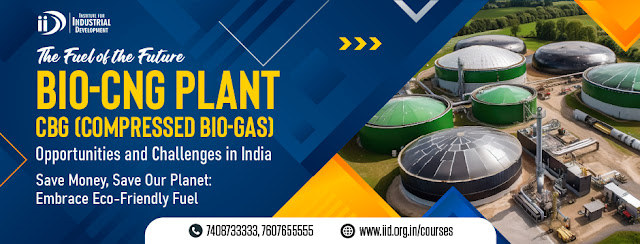Bio CNG Plant: Opportunities and Challenges in India 2024
Explore the future of waste management in India with our comprehensive Bio-CNG course and industry setup process. Learn about the opportunities and challenges of 2024, including Bio-CNG plant costs, biomass energy utilization, and the purification process. Join IID as we work together to create a greener tomorrow, helping to develop a future driven by environmentally friendly and sustainable energy solutions.
Bio-CNG Plant Opportunities in 2024
Waste management has emerged as one of the most significant challenges in our rapidly changing world, especially in a nation with as many people as India. With an urgent need for sustainable solutions, the emergence of Bio-CNG plants in India is reshaping the waste management landscape. This article delves into the waste management process in India, shedding light on crucial aspects such as Bio-CNG plant cost, biomass energy, biogas purification, and the challenges surrounding the lack of Bio-CNG plant setup processes.
The Waste Management Challenge in India
India, with its growing population, faces an escalating waste crisis. Conventional methods, such as open burning, and landfills, not only worsen the environment but also present serious health risks. Being aware that creative solutions are required and recognizing the need for innovative solutions, the country has increasingly turned towards alternative technologies. Bio-CNG plants have emerged as a beacon of sustainability.
Bio-CNG Plant Cost: Investing in a Greener Future
One of the key considerations in waste management is the cost associated with implementing sustainable practices. Bio-CNG plants in India, utilizing advanced technology to transform organic waste into biogas, present a sustainable and economically efficient remedy for waste management challenges. The long-term advantages of establishing a Bio-CNG plant, such as lower waste disposal costs and renewable energy production, exceed the initial expenditure.
Harnessing Biomass Energy for a Cleaner Tomorrow
Central to the waste-to-energy process is the utilization of biomass. Bio-CNG plants leverage organic waste materials such as agricultural residue, food waste, and animal manure to produce biogas, a clean and renewable energy source. This course helps with India’s aspirations to move towards a sustainable and green energy future while simultaneously addressing the trash issue.
Biogas Purification Process: Filtering Purity from Waste
The biogas produced in the Bio-CNG plants undergoes a rigorous purification process. The process ensures that the end product, Bio-CNG, meets the required clean and efficient fuel goal. The purification process removes impurities, making Bio-CNG an eco-friendly alternative to conventional fuels, further reducing the carbon footprint.
Lack of the Bio Gas CNG Plant Setup Process: A Hurdle to Overcome
While the potential benefits of Bio-CNG plants are immense, there exists a challenge in the lack of a streamlined setup process. The plant prevents widespread adoption since it could be difficult for waste management authorities and potential investors to understand the complexities required in setting up Bio-CNG plants. Addressing this gap through comprehensive guidelines and support can accelerate the integration of this sustainable solution.
Paving the Way for Sustainable Waste Management
The waste management process in India is transforming with the advent of Bio-CNG plants. These plants support the nation’s objectives for renewable energy sources and provide a solution to the garbage problem. In delving into concerns encompassing the financial implications of Bio-CNG plant establishment, the optimal utilization of biomass energy, and the intricacies within purification methodologies, India is on the path to spearheading a progressive shift towards a more sustainable and ecologically harmonious future. This progression is rooted in the comprehensive exploration of challenges associated with bio-CNG plant expenses, the harnessing of biomass energy, and the refinement procedures imperative to this journey. Stakeholders and authorities must collaborate in overcoming challenges, ensuring a smooth transition to a cleaner and more environmentally conscious waste management paradigm.
Bio-CNG plants offer a cost-effective and sustainable solution to India’s waste management challenges. Despite their immense potential, the lack of a streamlined setup process hinders widespread adoption. To overcome this obstacle, stakeholders can seek incubation support from institutions like IID(Institute of Industrial Development). From in-depth training to Bio-CNG project reports, IID provides tailored assistance for successfully establishing Bio-CNG plants. Embracing this support is crucial for propelling India towards a greener and more sustainable future in waste management. Act now, collaborate with IID, and contribute to a cleaner tomorrow.




Comments
Post a Comment